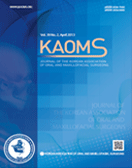Journal of the Korean Association of Oral and Maxillofacial Surgeons
- P-ISSN2234-7550
- E-ISSN2234-5930
- SCOPUS, KCI, ESCI
 ISSN : 2234-7550
ISSN : 2234-7550
Management and prevention of third molar surgery-related trigeminal nerve injury: time for a rethink
Abstract
Trigeminal nerve injury as a consequence of lower third molar surgery is a notorious complication and may affect the patient in long term. Inferior alveolar nerve (IAN) and lingual nerve (LN) injury result in different degree of neurosensory deficit and also other neurological symptoms. The long term effects may include persistent sensory loss, chronic pain and depression. It is crucial to understand the pathophysiology of the nerve injury from lower third molar surgery. Surgery remains the most promising treatment in moderate-to-severe nerve injuries. There are limitations in the current treatment methods and full recovery is not commonly achievable. It is better to prevent nerve injury than to treat with unpredictable results. Coronectomy has been proved to be effective in reducing IAN injury and carries minimal long-term morbidity. New technologies, like the roles of erythropoietin and stem cell therapy, are being investigated for neuroprotection and neural regeneration. Breakthroughs in basic and translational research are required to improve the clinical outcomes of the current treatment modalities of third molar surgery-related nerve injury.
- keywords
- Trigeminal nerve injuries, Inferior alveolar nerve, Lingual nerve, Third molar, Postoperative complications
- 다운로드 수
- 조회수
- 0KCI 피인용수
- 0WOS 피인용수